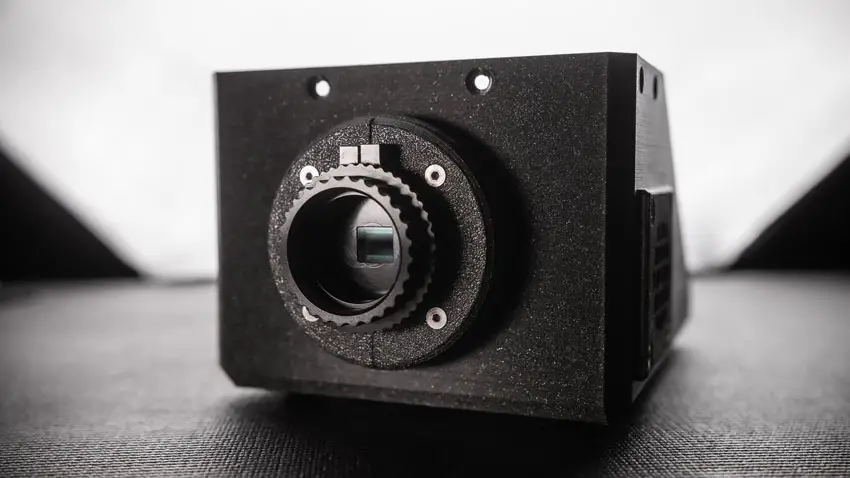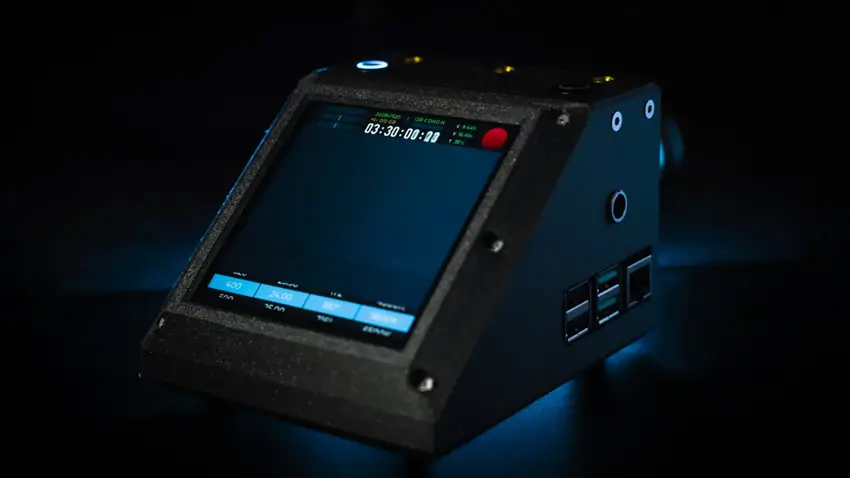There is an open-source camera project known as CinePi, which seeks to further democratize filmmaking by creating a build-it-yourself cinema camera that shooters can customize to their own specs and still achieve professional-looking results. And they can do it for under $400.
The CinePi is the brainchild of Csaba Nagy who has had an avid interest in the inner workings of cinema cameras since he bought the 2.5K Blackmagic Pocket Cinema Camera back in 2013.

Image Credit – Csaba Nagy/CinePi
“I really enjoyed using that camera; filming in RAW was a game changer for me,” Nagy told DIYPhotography. “I like the idea that cameras and their hardware/software could be more accessible, well understood, and tinkered with in general.”
Nagy said that his CinePi design embraces the spirit of such projects as Magic Lantern and the homebrew Apertus project which seeks to design a cinema camera from the ground up, including image sensors.
However, with a Raspberry Pi, a camera can be built with a very accessible, off-the-shelf, and more importantly CHEAP single-board computer that can take full advantage of open-source hardware and software to achieve professional-grade cinematic results.

Image Credit – Csaba Nagy/CinePi
“It does seem kind of silly to use a Raspberry Pi as a cinema camera; That is until you realize that at its essence, what is a cinema camera but a sensor and a processor board,” Cagy added.
“Raspberry Pi is the most accessible type of open hardware and software available, so it’s kind of a no-brainer.”

Image Credit – Csaba Nagy/CinePi
Cagy’s first prototype was capable of capturing 2K video at up to 50 frames per second, but with the introduction of Raspberry Pi 4, he was able to quickly transition to version 2 and achieve 4K resolution with 12-bit Cinema DNG Raw.
Version 2 of CinePi uses a Super8-sized Sony IMX477 image sensor capable of capturing up to 4K video in 12-bit Raw.
Using a Raspberry Pi 4B processor and a next-generation camera module, the open-source project also supports external SSD recording via USB 3.0, support for a four-inch high-resolution LCD touchscreen, and a fan-driven Noctua cooling system.

Image Credit – Csaba Nagy/CinePi
Cagy also says that HDMI output is possible, however, he has yet to accomplish this and still maintains a simultaneous LCD preview.
The camera is powered by an internal high-capacity battery and is encased in a 3D printed case with 1/4-20 mounting points with ethernet, USB 3.0, and a variety of other ports.
The downside is that the Raspberry Pi’s camera module relies on a screw-on, C-mount lens, which usually means relying on poorer quality security camera optics, or hard-to-find Russian-made lenses.
However, there are C-mount lens adapters that could give a Home Brew cinematographer the ability to squeeze as much image quality out of the processor and module as possible.

Image Credit – Csaba Nagy/CinePi
In fact, according to Cagy’s Reddit update, he is tinkering with a recovered micro-four-thirds lens mount and a larger IMX283 image sensor.
He’s also developing what he calls a CinePi XL to house the larger components. And there’s even Bluetooth control via an app Cagy has developed.
The total cost of the CinePi project hovers just under $400, with the most expensive part being the Pimoroni HyperPixel 4” touchscreen at $75.00, followed by the 8GB Raspberry Pi 4 processor board at $75.00, and the Pi HQ camera module at $50.
The remainder of the off-the-shelf cables, connectors, switches, computer fans, and 3D-printed casing come in at under $22, making the entire homebrew camera a very affordable cinematic experiment.
It’s not going to win an Oscar any time soon, but for the price, the CinePi not only educates on how a Cinema camera functions, but it can also provide impressive results.
And with Raspberry Pi 5 on the horizon and the overall open-source pedigree of the project, the sky is the limit as to what unique specs a built-it-yourself camera can end up with.
You can follow the development of CinePi on Reddit, or at Cagy’s CinePi GitHub page, where you can find step-by-step instructions, as well as the various software and 3D print files. There is also a CinePi community on Discord where other enthusiasts are taking the next steps.
Disclaimer: As an Amazon Associate partner and participant in B&H and Adorama Affiliate programmes, we earn a small comission from each purchase made through the affiliate links listed above at no additional cost to you.



